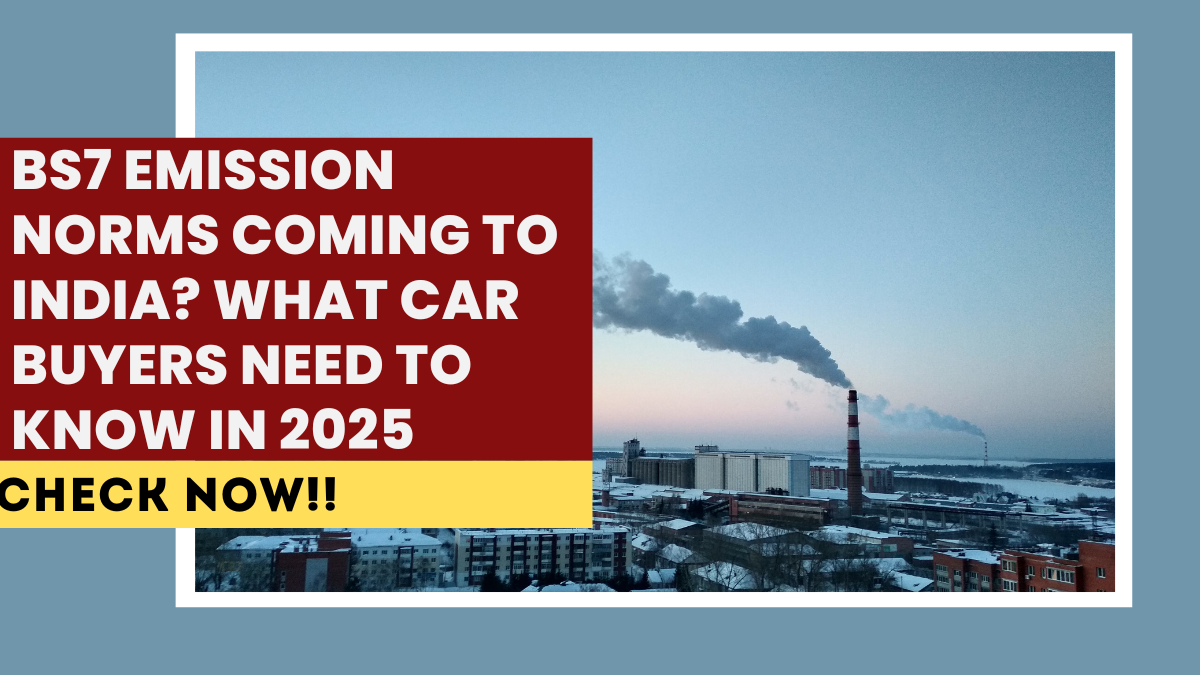The Indian automobile sector is once again preparing for a major regulatory shift as the government considers implementing BS7 emission norms India 2025. After the introduction of BS6 Phase 2 in 2023, manufacturers and buyers have been anticipating the next big step in curbing vehicular pollution. The new emission standards are expected to be stricter, aligning India with global benchmarks. For car buyers, the pollution rules update could mean changes in prices, fuel options, and available models from late 2025 onwards.

What Are BS Emission Norms?
The term BS (Bharat Stage) emission norms refers to the regulatory standards set by the Government of India to control the output of air pollutants from internal combustion engine vehicles. These norms are modeled after European standards.
-
BS4 (2017): Introduced nationwide to regulate particulate matter and nitrogen oxides.
-
BS6 (2020): Skipped BS5 and adopted stringent controls directly aligned with Euro 6 standards.
-
BS6 Phase 2 (2023): Added real driving emission (RDE) testing requirements.
-
BS7 (Upcoming 2025): Expected to further reduce permissible levels of carbon monoxide, hydrocarbons, and nitrogen oxides, making vehicles cleaner and greener.
Key Features Expected in BS7 Norms
The government has not released final guidelines yet, but based on global standards and discussions, the BS7 framework may include:
-
Lower Emission Thresholds: Stricter limits for nitrogen oxides (NOx) and carbon monoxide.
-
Advanced Onboard Diagnostics (OBD): Cars will feature sensors to continuously monitor emissions.
-
Real-Time Data Monitoring: Mandatory telematics to track emissions performance.
-
Focus on Hybrids and EVs: Petrol and diesel vehicles may see limited options, while hybrids and EVs could become more attractive.
-
Incentives for Cleaner Fuels: CNG and ethanol-blended fuels will likely gain higher acceptance.
Impact on Car Buyers in 2025
The shift to BS7 norms will affect consumers in several ways.
-
Higher Vehicle Prices: Cars equipped with advanced emission-control technologies will be costlier. Price hikes of ₹80,000–₹1.5 lakh are expected for petrol and diesel vehicles.
-
Limited Diesel Options: With already shrinking diesel line-ups, many manufacturers may discontinue small-capacity diesel cars altogether.
-
EV and Hybrid Push: Buyers looking for long-term savings may shift to hybrid or electric cars to avoid higher compliance costs.
-
Better Fuel Quality: Fuel pumps will upgrade to supply BS7-compliant petrol and diesel, ensuring cleaner combustion.
-
Resale Value of Older Cars: BS4 and early BS6 models may see lower resale demand due to stricter pollution rules.
Impact on Automakers
Manufacturers are under pressure to upgrade technology while keeping costs under control.
-
Investment in R&D: Automakers are investing heavily in emission-control systems.
-
Portfolio Shift: More focus on hybrids, CNG, and EVs to balance compliance costs.
-
Export Potential: Stricter norms make Indian vehicles globally competitive, opening new export opportunities.
Government’s Push for BS7 Norms
The government is driving BS7 norms to meet its climate and pollution reduction targets. With India’s COP commitments and rising concerns about air quality in metro cities, stricter rules are unavoidable. The timeline for rollout is expected to begin in late 2025, with phased implementation by 2026.
Should You Buy a Car Before BS7 Norms?
Car buyers are often confused about whether to buy now or wait for new regulations.
-
If you need a car immediately, buying before BS7 can save money, as prices will increase afterward.
-
If you are considering EVs or hybrids, waiting for post-BS7 models may give you better options with new technologies.
-
For diesel buyers, it may be wise to buy earlier, as many diesel models could be discontinued by BS7 rollout.
Conclusion
The BS7 emission norms India 2025 are set to bring cleaner air and advanced vehicle technology but at a higher cost for buyers. While the final guidelines are still awaited, the direction is clear—India is moving toward stricter pollution control and greener mobility. Car owners must weigh affordability against future compliance, keeping in mind that EVs and hybrids are becoming stronger alternatives.
FAQs
What is the expected implementation date of BS7 norms?
BS7 norms are likely to begin rollout in late 2025, with full adoption expected by 2026.
How will BS7 norms affect car prices?
Vehicle prices may rise by ₹80,000–₹1.5 lakh due to advanced emission control technologies.
Will diesel cars be available after BS7 norms?
Many small-capacity diesel cars may be discontinued, though larger SUVs may still offer diesel variants.
Will BS7 norms impact fuel quality?
Yes, fuel stations will supply BS7-grade petrol and diesel, which are cleaner and compatible with updated engines.
Should I buy a car before or after BS7 norms?
If you want affordability, buy before BS7. If you want future-proof technology, waiting may be beneficial.
Click here to know more.
